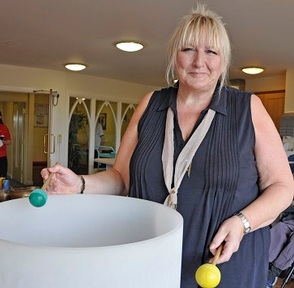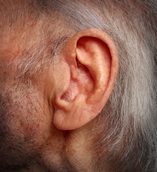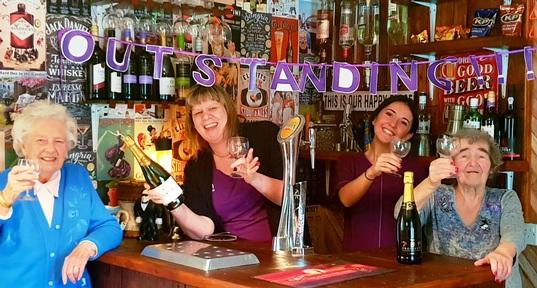Aboriginal rain sticks improving the lives of dementia patients
Two care homes in Dorset have noticed their residents are noticeably more relaxed and responsive after involvement in an innovative programme of sound therapy. The programme which involves playing Himalayan and pure quartz crystal bowls aims to create tunes which ‘declutter the brain’.
Sandra Chattaway, a sound therapy practitioner, who leads the sessions at the Colten Care specialist homes said: “You can see the residents becoming calmer within minutes. The more frequently the sessions are held, the quicker they appear to respond. Their brains recognise the sounds and they are predisposed to be responsive to the benefits.”  In addition to crystal bowls, Ms Chattaway also uses percussion instruments during her performance, specifically soft bells and Aboriginal rain sticks which fascinate residents who like to touch and feel them as well as listen. “The percussion instruments are used as a grounding process to bring people gently round,” said Ms Chattaway. “It’s really interesting to see people at the end of each session. It’s evident that residents get a great deal out of the treatment judging by their response.”
In addition to crystal bowls, Ms Chattaway also uses percussion instruments during her performance, specifically soft bells and Aboriginal rain sticks which fascinate residents who like to touch and feel them as well as listen. “The percussion instruments are used as a grounding process to bring people gently round,” said Ms Chattaway. “It’s really interesting to see people at the end of each session. It’s evident that residents get a great deal out of the treatment judging by their response.”
Fernhill care home in Longham and The Aldbury care home in Parkstone, Poole, where the sessions are being held have found Ms Chattaway’s techniques to be highly effective and relatives of their residents are even timing their visits for just after sound therapy has concluded, when residents appear to be at their most calm and less agitated.  Denise Arthur-Briskham, home manager at The Aldbury, said: “The sessions help residents relax which has obvious benefits for them. Feedback from relatives shows that they notice their loved ones are calmer, more lucid and less agitated afterwards.” June Gallagher Colten Care operations manager said: “We are using sound therapy in two of our dementia homes with residents who are more advanced on their journeys. The positive difference it is making to them and their relatives is really evident.”
Denise Arthur-Briskham, home manager at The Aldbury, said: “The sessions help residents relax which has obvious benefits for them. Feedback from relatives shows that they notice their loved ones are calmer, more lucid and less agitated afterwards.” June Gallagher Colten Care operations manager said: “We are using sound therapy in two of our dementia homes with residents who are more advanced on their journeys. The positive difference it is making to them and their relatives is really evident.”
Although no formal clinical study has been taken, Ms Chattaway is hopeful her success so far will warrant one in the near future: “If we can prove this is effective for people with Alzheimer’s and dementia it would be quite revolutionary.”
Colten Care has produced a short film about its approach to dementia care which features on its YouTube channel – www.youtube.com/coltencare. The film includes the sound therapy sessions.
Colten Care runs 19 care homes across Dorset, Hampshire and Wiltshire.
Latest Innovative Care News
 13-May-19
'Pink drink' brain cancer treatment rolled out across NHS in memory of Baroness Jowell
13-May-19
'Pink drink' brain cancer treatment rolled out across NHS in memory of Baroness Jowell
 25-Apr-19
Louis Tomlinson helps 83-year-old who lost wife to dementia complete bucket list
25-Apr-19
Louis Tomlinson helps 83-year-old who lost wife to dementia complete bucket list
 22-Mar-19
UK's top care home handyman takes residents to pub for pie and pint
22-Mar-19
UK's top care home handyman takes residents to pub for pie and pint
 12-Feb-19
Michael McIntyre's jokes tested to see if they stop elderly catching flu
12-Feb-19
Michael McIntyre's jokes tested to see if they stop elderly catching flu
 07-Jan-19
'We were lucky to find it': Family's delight as care home is rated Outstanding
07-Jan-19
'We were lucky to find it': Family's delight as care home is rated Outstanding